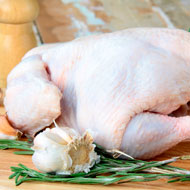
More than 70 per cent of fresh, shop-bought chickens tested by the Food Standards Agency (FSA) tested positive for the bacteria campylobacter.
Published yesterday (29 May), these findings are the final set of results from a year-long survey.
From February 2014 to February 2015, the FSA tested over 4,000 samples of whole, fresh chickens and packaging bought from large retailers and smaller independent shops and butchers.
Key results from the year:
- 73 per cent of chickens tested positive for campylobacter
- 19 per cent of chickens tested positive within the highest band of contamination
- 7 per cent of packaging tested positive for the presence of campylobacter
- 0.1 per cent tested positive within the highest band of contamination
Four major retailers published case studies yesterday to demonstrate the results of their efforts to reduce campylobacter on their raw whole chickens. Data from Marks & Spencer, Morrisons, the Co-op and Waitrose shows 'significant' decreases, the FSA said as it welcomed the news.
Director of policy, Steve Wearne, commented: "I am absolutely delighted to see the really encouraging results from these four supermarkets and their suppliers. They are making a real difference to public health, helping to cut down on the estimated 280,000 people who get ill from campylobacter each year."
He challenged other retailers to achieve the same level of reductions and to demonstrate the impact of their campylobacter-reducing strategies.
FSA has confirmed it will begin a new survey this summer, again testing fresh whole chickens. This will allow the government body to assess the impact of steps taken by the food industry to tackle campylobacter.
Richard MacDonald, chair of the Acting on Campylobacter Together board, said: "I hope we continue to see further progress in our fight to significantly reduce or even eradicate campylobacter on chickens. Individual actions and cross-industry sharing of best practice are starting to have a real and tangible impact."
For the full report: http://www.food.gov.uk/sites/default/files/full-campy-survey-report.pdf



 The Veterinary Medicines Directorate (VMD) is inviting applications from veterinary students to attend a one-week extramural studies (EMS) placement in July 2026.
The Veterinary Medicines Directorate (VMD) is inviting applications from veterinary students to attend a one-week extramural studies (EMS) placement in July 2026.